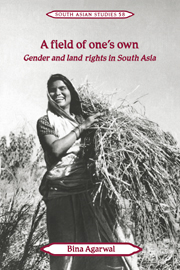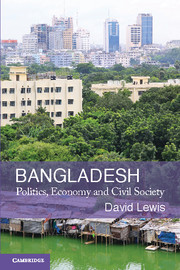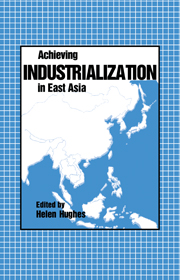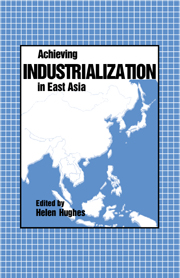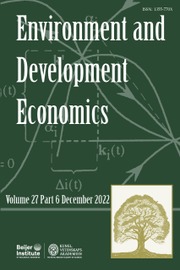A Field of One's Own
This is the first major study of gender and property in South Asia. In a pioneering and comprehensive analysis Bina Agarwal argues that the single most important economic factor affecting women's situation is the gender gap in command over property. In rural South Asia, the most significant form of property is arable land, a critical determinant of economic well-being, social status, and empowerment. But few women own land; fewer control it. Drawing on a vast range of interdisciplinary sources and her own field research, and tracing regional variations across five countries, the author investigates the complex barriers to women's land ownership and control, and how they might be overcome. The book makes significant and original contributions to theory and policy concerning land reforms, 'bargaining' and gender relations, women's status, and the nature of resistance.
- First comprehensive study of gender and property in South Asia
- Crosses the disciplines, i.e. economic development, agricultural and rural economics, gender/women's studies, anthropology
- An original, accessibly written book by author well-known in the field
Awards
Winner of the A. K. Coomaraswamy Book Prize 1996 (Association for Asian Studies, USA)
Winner of the Edgar Graham Book Prize 1996 (Dept. of Dev. Studies, SOAS, University of London)
Winner of the K. H. Batheja Award 1995–96 (Batheja Trust, Bombay University).
Reviews & endorsements
"This is a book of great importance and much originality, dealing with the problem of gender inequality in economic and social contexts. Dr. Agarwal has focused on the crucial role of inequality in property rights, particulary in land ownership. Her thorough exploration of this perspective substantially enriches our understanding of causal factors behind the deprivation of women in South Asia--and possibly elsewhere as well." Amartya Sen, Harvard University
"A Field of One's Own is a monumental study examining the gender gap in land rights in South Asia....It makes a valuable contribution to the fields of economics, sociology, and anthropology." Contemporary Sociology
"Agarwal underlines the need for an interdisciplinary approach to questions such as genderinequality and land rights....And thus, Agarwal stresses on the need for mobilising and organising rural women if equal land rights have to be achieved....One may not agree with the political project of Agarwal, but the detailed accounts of actually existing gender relations in the different parts of South Asia and the analytical rigour with which she presents her arguments are simply compelling. By using history, ethnography and maps, she has constructed a story that is both interesting and thought provoking. Even those with no political conviction will find the book a fruitful reading." Surinder S. Jodhka, Indian Journal of Agricultural Economics
"Bina Agarwal makes an important contribution to the critical assessment of the `condition of South Asia' fifty years after independence. ...this well-informed review of cultural practices as well as of property and inheritance laws provides us with a firmer bases for thinking through strategies to improve the condition of women in South Asia." Barrie M. Morrison, Pacific Affairs
Product details
April 1995Paperback
9780521429269
596 pages
228 × 152 × 35 mm
0.831kg
13 maps
Available
Table of Contents
- Preface
- l. Land rights for women: making the case
- 2. Conceptualizing gender relations
- 3. Customary rights and associated practices
- 4. Erosion and disinheritance: traditionally matrilineal and bilateral communities today
- 5. Contemporary law: contestation and content
- 6. Whose share? Who claims? The gap between law and practice
- 7. Whose land? Who commands? The gap between ownership and control
- 8. Tracing cross-regional diversities
- 9. Struggles over resources, struggles over meanings
- l0. The long march ahead.

